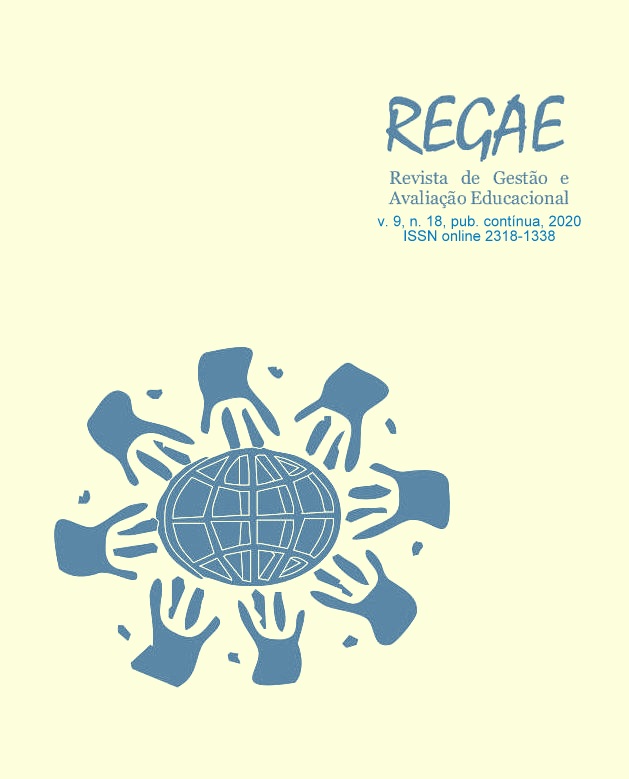Particularities of a federal institute and its professors
DOI:
https://doi.org/10.5902/2318133843883Keywords:
Institutos Federais de Educação. Trabalho docente.Abstract
This article was elaborated from preliminary data from one of the researches developed in the Research, Teaching and Extension Group - Teaching, school and Teacher Training combined with the Professional Master's Program in Public Policies and Educational Management of Federal University of Santa Maria. As its objective, we aim to highlight the main characteristics of the context of a Federal Institute of Education, Science and Technology in the State of Rio Grande do Sul and of the teachers inserted there. The methodology used had a qualitative approach, using observation, document analysis and logbook. From the investigations, we were able to identify some of the specificities of the Federal Institute in general, the investigated context and the teaching work in that context.
Key-words: federal institutes of education; teacher; teaching work.
Downloads
References
BRASIL. Lei n. 11.892, de 29 de dezembro de 2008: institui a rede federal de educação profissional, científica e tecnológica, cria os institutos federais de educação, ciência e tecnologia, e dá outras providências. Brasília: DOU, 30 dez. 2008a, seção 1, p.1.
GARCIA, Carlos Marcelo. El professorado principiante: inserción de la docência. Barcelona: Octaedro, 2009.
GHEDIN, Evandro; FRANCO, Maria Amélia Santoro. Questões de método na construção da pesquisa em educação. São Paulo: Cortez, 2011.
HYPÓLITO, Álvaro Moreira. Políticas curriculares, Estado e regulação. Educação & Sociedade, Campinas, v. 31, n. 113, 2010, p. 1337-1354.
KUENZER, Acacia Zenaida. O ensino médio no plano nacional de educação 2011-2020: superando a década perdida? Educação & Sociedade, Campinas, v. 31, n. 112, 2010, p. 851-874.
NÓVOA, António. A profissão professor. Porto: Porto Editora,1995.
OLIVEIRA, Dalila Andrade. Regulação educativa na América Latina: repercussões sobre a identidade dos trabalhadores docentes. Educação em Revista, Belo Horizonte, v. 44, 2006, p. 209-227.
OLIVEIRA, Dalila Andrade; ASSUNÇÃO, Ada. Intensificação do trabalho e saúde dos professores. Educação & Sociedade, Campinas, v. 30, n. 107, 2009, p. 349-372.
PACHECO, Eliezer. Os institutos federais: uma revolução na educação profissional e tecnológica. São Paulo: Moderna, 2011.
PACHECO, Eliezer Moreira. Os institutos federais, uma revolução na educação profissional e tecnológica. Disponível em http://portal.mec.gov.br/setec/arquivos/pdf/insti_evolucao.pdf. Acesso em 17 maio 2016.
PORLÁN, Rafael; MARTÍN, José. El diario del profesor. Sevilla: Díada, 1997.
SANTOS. Maria Eliza Gama. Elementos constitutivos do trabalho docente em uma escola pública de educação básica: prescrições, atividades e ações. Santa Maria: UFSM, 2011. 342f. Tese (Doutorado em Educação). Universidade Federal de Santa Maria.
SANTOS, Jailson Alves dos. A trajetória da educação profissional: da colônia a república. In: LOPES, Eliane Marta Teixeira; FILHO, Luciano Mendes de Faria. 500 anos de educação no Brasil. Belo Horizonte: Autêntica, 2007, p. 205-224.
ZABALZA, Miguel A. Diários de aula: um instrumento de pesquisa e desenvolvimento profissional. Porto Alegre: Artmed, 2004.
Downloads
Published
How to Cite
Issue
Section
License
Authors keep copyright and concede to the magazine the right of first publication, with the work simultaneously licensed under the Creative Commons Attribution 4.0 International, non-commercial license with no derivative work, which allows to share the work with no author recognition and initial publication in this magazine.
Authors has authorization to overtake additional contracts separately, to distribute a non-exclusive version of the work published in this magazine: For example: to publish in an institutional repository or as a chapter of a book, with authorial recognition and initial publication in this magazine.
Authors are allowed and are encouraged to publish and distribute their work online. For example: in institutional repositories or in their own personal page – at any point before or during the editorial process, because this can result in productive changes, as well as increase the impact and the mention to the published work.






